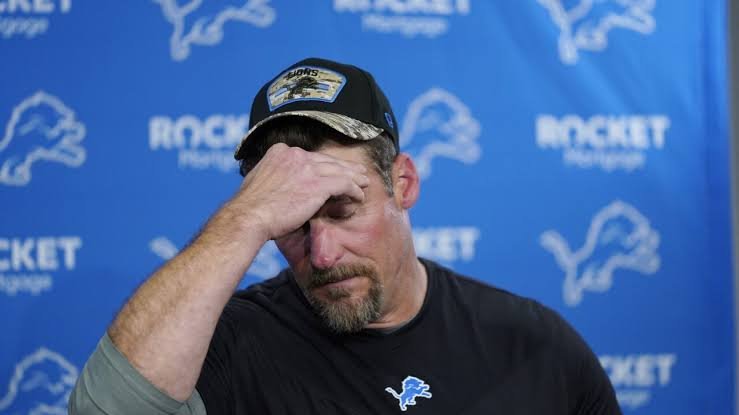# **Wolverines AD Warde Manuel Shocks Fans with Aggressive Departure After Record-Breaking Contract with Nebraska**
In a stunning move that has rocked the college athletics world, longtime University of Michigan Athletic Director Warde Manuel has accepted a lucrative contract from the University of Nebraska, leaving behind his alma mater in what is being described as one of the most aggressive financial maneuvers in recent college sports history.
## **A Historic Deal That Reshapes College Athletics**
Manuel’s departure comes just months after securing Michigan’s place as a dominant force in collegiate athletics, both financially and competitively. His tenure saw record-breaking revenue generation, lucrative media deals, and unprecedented success on the field, particularly in football and basketball. However, Nebraska’s offer—reportedly valued at over $10 million annually over a multi-year period—proved too substantial to ignore. This contract is believed to set a new benchmark for athletic director compensation, signaling a major shift in the financial landscape of NCAA sports leadership.
Industry insiders speculate that Nebraska, which has been aggressively seeking to reclaim its football dominance, saw Manuel as the perfect candidate to execute a turnaround strategy. His track record in securing high-profile coaching hires, maximizing athletic department revenue, and leading championship-level programs made him an attractive target.
## **Financial Implications for Michigan**
Manuel’s sudden departure leaves Michigan in a precarious position. As one of the top-grossing athletic departments in the country, Michigan has long relied on Manuel’s financial acumen. Under his leadership, Michigan Athletics surpassed $200 million in annual revenue, securing top-tier sponsorship deals and benefiting from the Big Ten’s record-breaking media rights agreement worth more than $7 billion.
His exit raises concerns about the program’s financial stability, particularly in an era where NIL (Name, Image, and Likeness) deals, conference realignments, and escalating coaching salaries require sharp financial management. The university will now face the challenge of replacing a leader who not only understood the business of college athletics but also had deep institutional ties to Michigan.
## **What Nebraska Gains from This Move**
Nebraska’s bold move is more than just a personnel change; it’s a financial statement. The Cornhuskers have struggled to remain competitive in the Big Ten since joining in 2011, with their football program failing to reach the heights of its national championship era. By luring Manuel with a historic contract, Nebraska signals its intent to invest heavily in its athletic future.
Nebraska’s athletic department, while not as financially dominant as Michigan’s, still ranks among the nation’s wealthiest, generating close to $150 million annually. The school has been searching for a transformative figure who can elevate its athletic brand, increase donor contributions, and restructure its NIL strategy to attract top-tier talent. Manuel’s hiring suggests that Nebraska is prepared to make aggressive financial moves to regain national prominence.
## **The Broader Impact on NCAA Athletics**
Manuel’s record-breaking contract is likely to have ripple effects across college athletics. Athletic directors have traditionally been well-compensated, but his deal with Nebraska sets a new precedent for what elite administrators can command in the open market.
This move may encourage other universities to reassess how they compensate and retain top-tier athletic directors. Schools with successful programs will now face increased pressure to match or exceed the financial packages offered by competitors. Additionally, this could push universities to allocate even more resources toward their athletic departments, potentially exacerbating the growing divide between the richest programs and smaller schools struggling to compete.
## **Michigan’s Next Steps**
With Manuel’s departure, Michigan faces an immediate leadership void. The university will likely launch a national search for a replacement, considering both internal candidates and external industry leaders. Key factors in the hiring process will include financial expertise, fundraising capabilities, and the ability to navigate the evolving NIL landscape.
In the short term, Michigan will need to reassure donors, corporate sponsors, and student-athletes that its commitment to athletic excellence remains unchanged. The school must also ensure that its upcoming financial and strategic decisions—such as coaching contracts and facility investments—are handled smoothly despite the transition.
## **Conclusion**
Warde Manuel’s shocking move to Nebraska is more than just a leadership change—it’s a financial power play that signals a new era in college sports. The record-breaking contract underscores the growing financial stakes in NCAA athletics, where athletic directors are now viewed as key figures in shaping the future of billion-dollar programs.
While Michigan must now regroup and find a new leader, Nebraska has made it clear that it is willing to spend big to reclaim its place among college football’s elite. The coming years will determine whether this financial gamble pays off, but one thing is certain: the economics of college sports will never be the same.



